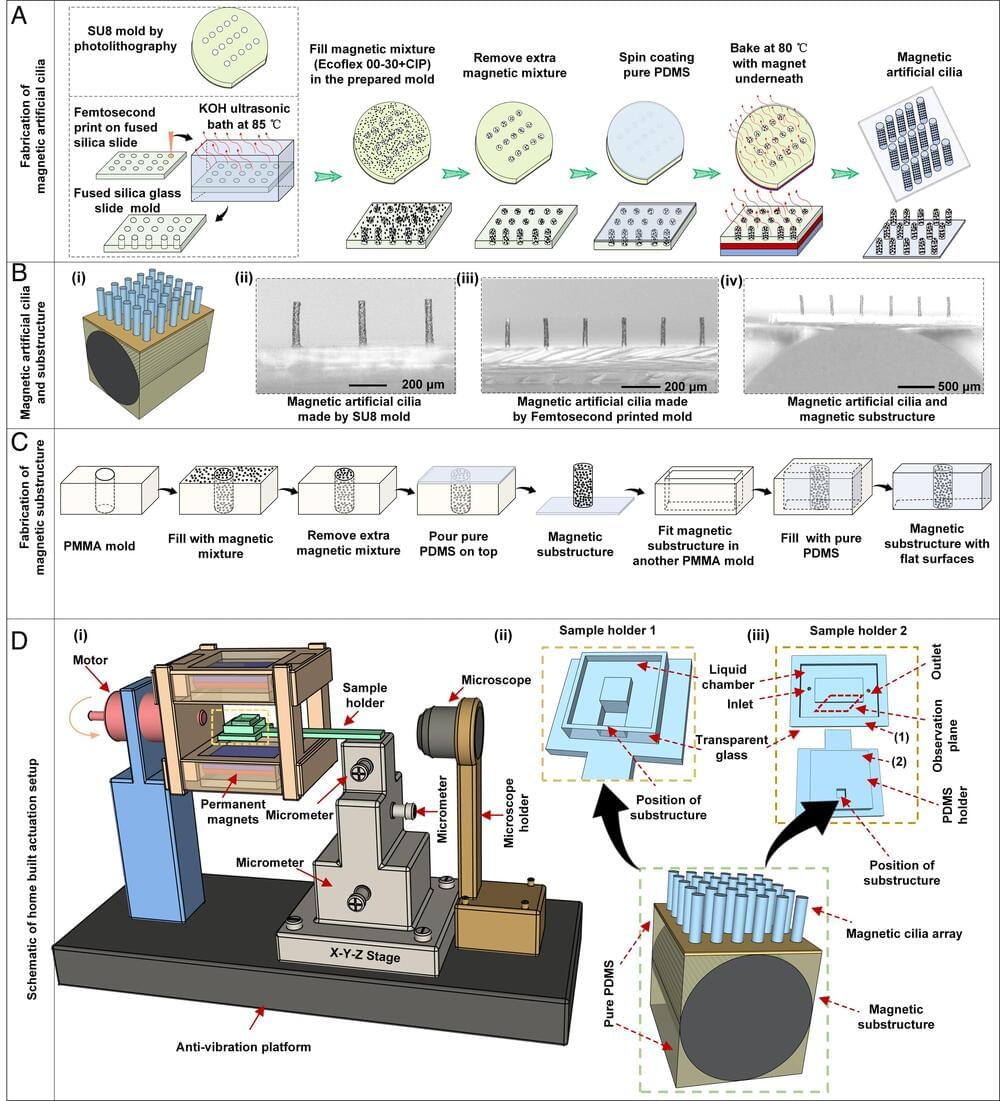Scientists have decoded the Y chromosome in full for the first time. | With the help of advanced algorithms and DNA sequencing techniques, scientists have decoded the Y chromosome in full for the first time.



From zero to 100 km/h in less than a second: a racing car built by students has broken the world record for electric vehicle acceleration, a Swiss university said Tuesday.
Students from the Swiss Federal Institute of Technology Zurich (ETHZ) and the Lucerne University of Applied Sciences designed and built the “Mythen” vehicle that achieved the feat, ETHZ said in a statement.
“Now, Guinness World Records has confirmed that Mythen broke the previous world acceleration record for electric vehicles,” it said.


A small team of engineers at Eindhoven University of Technology in the Netherlands, working with a colleague from the Max Planck Institute for Intelligent Systems in Germany, has found a way to create tiny artificial cilia that work at the microscale. Their study is reported in the Proceedings of the National Academy of Sciences.
Cilia are tiny appendages that microscopic organisms use to move through a fluid. Prior research has shown that they are efficient—some paramecia are able to move at a rate of 10 times their own length per second. Prior research has also shown that cilia also move fluid. In the human lung, they work to clear away mucus.
Because of their usefulness, scientists have been studying cilia looking for a way to replicate them for use in desired applications. Such efforts have until now been stymied by the problem of creating working cilia at the microscale. In this new effort, the researchers have overcome such problems and created the first artificial microscale working cilia.

NATIONAL HARBOR, Md. — U.S. chief space operations Gen. Chance Saltzman on Sept. 12 announced the Space Force will experiment with a new command structure where a unit is responsible for all aspects of a mission area, including training, procurement and operations.
Two integrated units will be established, each run by a Space Force colonel — one for space electronic warfare; and the other for positioning, navigation, and timing (PNT) satellites.
This is a departure from the current structure where responsibilities for procurement, maintenance, sustainment and operations are fragmented under separate chains of command, Saltzman said in a keynote speech at the Air & Space Forces Association’s annual conference.

PARIS – Elon Musk’s SpaceX is no longer absorbing the cost of the Starlink antennas that it sells with its satellite internet service, a company executive said on Wednesday, a key step to the company improving its profitability.
“We were subsidizing terminals but we’ve been iterating on our terminal production so much that we’re no longer subsidizing terminals, which is a good place to be,” Jonathan Hofeller, SpaceX vice president of Starlink and commercial sales, said during a panel at the World Satellite Business Week conference.
SpaceX sells consumer Starlink antennas, also known as user terminals, for $599 each. For more demanding Starlink customers – such as mobile, maritime, or aviation users – SpaceX sells antennas with its service in a range from $2,500 to $150,000 each.

Defying conventional wisdom, scientists have discovered a novel coupling mechanism involving leaky mode, previously considered unsuitable for high-density integration in photonic circuits.
This surprising discovery paves the way for dense photonic integration, transforming the potential and scalability of photonic chips in areas such as optical computing quantum communication, light detection and ranging (LiDAR), optical metrology, and biochemical sensing.
In a recent Light Science & Application publication, Sangsik Kim, associate professor of electrical engineering at Korea Advanced Institute of Science and Technology (KAIST), and his students at Texas Tech University demonstrated that an anisotropic leaky wave can achieve zero crosstalk between closely spaced identical waveguides using subwavelength grating (SWG) metamaterials.


The mission always had uncertainties. “If an asteroid were constructed as a monolithic rock, similar to the rocks we find on the ground, the deflection and calculations would be straightforward,” Peter Veres, an astronomer at the Center for Astrophysics, Harvard & Smithsonian, who was not involved in the study, tells Smithsonian magazine in an email. “Instead, we already knew from ground-based observations and several space missions that asteroids are often rubble piles—loosely aggregated spheres of large and small boulders, dust and sometimes ice, with numerous empty spaces.” Hitting one of these asteroids, Veres says, is almost more like striking a sponge than a rock, and it’s harder to predict the impact’s results.
Swift’s team shared their surprising new research at a meeting of the American Astronomical Society in June and posted a preprint of their paper on the online server Arxiv in August. According to Veres, the team relied on a widely used method and gathered enough data points to conclude that Dimorphos’ orbit is degrading.
As for why this may be happening, scientists only have guesses so far. One idea is that Dimorphos was once tidally locked to Didymos—meaning that, like Earth’s moon, the same side of the satellite always faced its host. But now, after the DART mission, this alignment might have been broken, causing Dimorphos to tumble around as the system’s tidal forces change its orbit. If this is the case, Veres says, Dimorphos will likely settle back into a tidally locked state over time.

The innovation – which has undergone advanced pre-clinical trials – is effective against a broad range of drug-resistant bacterial cells, including ‘golden staph’, which are commonly referred to as superbugs.
Antibiotic resistance is a major global health threat, causing about 700,000 deaths annually, a figure which could rise to 10 million deaths a year by 2050 without the development of new antibacterial therapies.
The new study led by RMIT University and the University of South Australia (UniSA) tested black phosphorus-based nanotechnology as an advanced infection treatment and wound healing therapeutic.
Results published in Advanced Therapeutics show it effectively treated infections,… More.
Researchers have invented a nano-thin superbug-slaying material that could be integrated into wound dressings to prevent or heal bacterial infections.